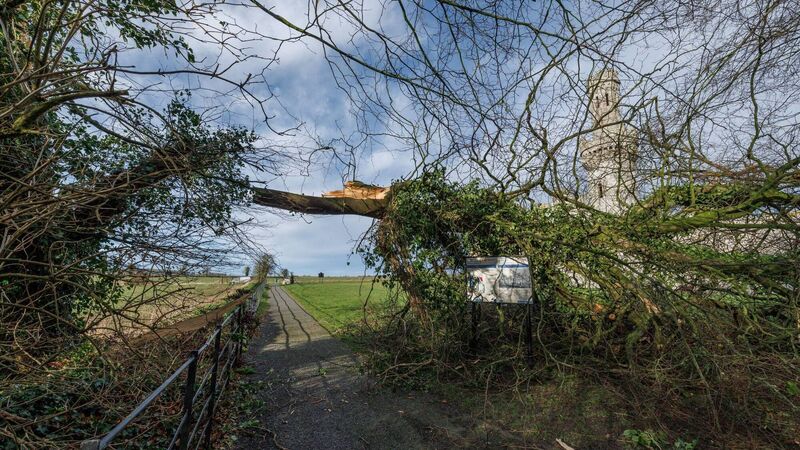Climate change poses 'security threat' to Irish economy and society

A fallen tree at Duckett's Grove in Carlow, in the wake of Storm Éowyn. While yet to be definitively linked to climate change, the storm demonstrated the crippling effect that extreme weather can have on critical national infrastructure, including electricity, water supply, and internet and mobile phone networks. Picture: Michael O'Rourke
Storm surges, flooding, and coastal erosion are likely to pose “significant risks” to the security of Irish society and economy in the coming years, according to a major Defence Forces document.
Climate change not only affects the island of Ireland but also, experts warn, its extensive sea area.
This threatens Ireland’s marine infrastructure, shipping, and offshore energy installations, which are set to expand significantly with offshore windfarms.
Papers in the Defence Forces Review 2024 also warn of threats from the far right, which fuels opposition to climate change measures such as taxes on fossil fuels and car restrictions, and the likely increase in migration.
While Storm Éowyn has yet to be definitively linked to climate change, it demonstrated the crippling effect that extreme weather can have on critical national infrastructure, including electricity, water supply, and internet and mobile phone networks.
It prompted a warning from Taoiseach Micheál Martin — who has been criticised over the State’s storm planning and response — that Ireland needed to prepare for more extreme weather.
The 170-page review, entitled ‘Climate Change, Security, and Defence,’ is being launched today by the Defence Forces, in collaboration with University College Cork.
In the review, Lieutenant Wietse Buwalda of the naval service said climate change was intensifying existing maritime security challenges: “Increased frequency and intensity of storms pose risks to maritime infrastructure, shipping, and offshore energy installations.
Sea-level rise threatens coastal communities and critical infrastructure, altering maritime boundaries and jurisdictions.
He criticised the “slow pace” in the implementation of the Government’s response to the Commission on the Defence Forces recommendations, saying that this indicated “a lack of urgency”. In a paper entitled ‘The Perfect Storm of Rising Tides and Rising Threats’, Lt Buwalda said Ireland had still not published a national security strategy or developed a maritime security strategy.
He said there was limited integration of data from various agencies and sensors, and “non-existent surveillance capabilities” in the air, space, and under water.
Colonel Timothy O’Brien, executive co-ordinator in the office of the chief of staff and former member of the government task force on emergency management, said Ireland faced “increased risk” of rising sea levels and coastal damage, and increased likelihood, and magnitude of, river and coastal flooding.
He said the Defence Forces’ aid to the civil authority role was likely to increase in the future.
However, he said as the Commission on the Defence Forces stated in its February 2022 report, the delivery of aid to the civil authority “should be valued, when considering the requirements for the appropriate capabilities, structures, and staffing of the Defence Forces”.
As reported in the Irish Examiner yesterday, Department of Defence figures show that the total strength of the Defence Forces stood at 7,557 at the end of 2024, compared to 8,568 in 2020 — well short of its supposed established strength of 9,739.
Col O’Brien said: “Climate change is an unavoidable global risk which poses significant risks to Irish society. It is likely that climate change will result in Ireland experiencing more extreme weather events in the coming years.”
Commandant Paul O’Callaghan said the far right, including in Ireland, exploits climate change for its own extremism ends, such as the claim that “Ireland is full”, and that climate migration poses “a threat to national identity, security, and resources”.
He added that the far right exploits fears of cheap migrant competition and the economic costs of climate measures for people already financially burdened.
CLIMATE & SUSTAINABILITY HUB
CONNECT WITH US TODAY
Be the first to know the latest news and updates





